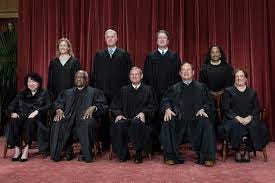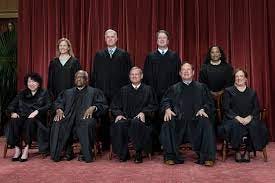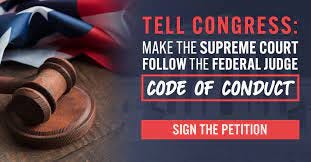Congress Should Legislate That the Code of Judicial Conduct Applies to All Justices of the Supreme Court
The Court Has Not Adopted Any Code of Conduct and Recent Transgressions Show the Need for Congress to Act
All district court judges and judges of the courts of appeals are all bound to follow the Code of Conduct for United States Judges, as adopted by the Judicial Conference initially on April 5, 1973 and then amended several times. But the Code of Conduct does not apply to the Justices of the United States Supreme Court. At various times one or more Justices have said the Justices are considering adopting a Code of Conduct, but to date there are no ethics rules governing Justices of the Supreme Court.
Lawyers in every state are bound to follow the Rules of Professional Conduct as adopted by each state supreme court or other state authority. So, lawyers, district and appellate court judges are all bound to follow explicit ethical rules but not the Justices of the Supreme Court.
Recent events show that in light of the reluctance of the Supreme Court Justices to adopt any ethical rules, the Congress should act by adding 28 U.S.C. sec 7 to the United States Code adopting the Code of Conduct for United States Judges as adopted by the Judicial Conference and amended from time to time, and providing notice to the public of any proposed amendments.
For those who think that Congress should not be legislating Codes of Conduct for the Supreme Court on some separation of powers arguments, it should be pointed out that the first five sections of 28 United States Code deal with the Supreme Court. 28 U.S. Code sec. 1 states that there are to be nine Justices of the Supreme Court, and that six Justices are necessary to constitute a quorum. 28 U.S. Code sec. 2 states that the Supreme Court shall hold a term of court commencing on the first Monday in October and shall hold such adjourned or special terms as are necessary. 28 U.S. Code sec. 3 states that in the event of the disability of the Chief Justice or if the office is vacant, “all of the chief justice’s powers and duties shall devolve upon the associate justice next in precedence until the disability is removed or another Chief Justice appointed and duly qualified.” 28 U.S. Code sec. 4 states that “associate justices shall have precedence according to the seniority of their commissions.” 28 U.S. Code sec. 5 states that “the Chief Justice and associate justices shall each receive a salary at annual rates determined under section 225 of the Federal Salary Act of 1967” as amended. So, Congress has legislated critical aspects of the organization and functioning of the Supreme Court.
In light of the failure of the Justices to adopt their own code of ethics, Congress has legitimate and lawful reasons for adopting a Code of Conduct applicable to the Justices of the Supreme Court and which could be added as a new section 7 to Title 28 of the U.S. Code.
Some of the recent events show why a code of ethics is necessary.
First, is the action of someone at the Supreme Court to release a draft of Justice Alito’s opinion in Dobbs v. Jackson Women’s Clinic. Chief Justice Roberts launched an investigation of that incident led by the Court’s marshal, but the public has learned nothing about that investigation. I published a substack Newsletter in July suggesting that it was Justice Thomas who released the draft Alito opinion, and I may be completely wrong in that opinion, but several have commented that my analysis was very persuasive.
Second, there is the recent New York Times article containing allegations that Justice Alito revealed the decision and himself as the author of the Hobby Lobby decision before it was released to a couple with whom he was having dinner. Justice Alito has denied the allegations as have one of his dinner companions, but the NY Times had significant documentation from a minister who ran an anti-abortion organization and one dedicated to promoting conservative religious views of ways he worked to provide entry for his members to meet and speak with Justices Scalia, Thomas and Alito on their views.
Third, there was the performance by Justice Alito at a recent meeting of the Federalist Society where he received rousing applause for his decision in Dobbs complete with news photographs of Alito grinning from ear to ear in the adulation of these legal conservatives.
Fourth, was Justice Alito making a presentation at a seminar in Rome on July 28, 2022 organized by the University of Notre Dame, where according to Politico, Justice Alito appearing as a surprise keynote speaker mocked “foreign leaders who lamented his opinion doing away with a half century of federal constitutional protection for abortion rights in the U.S.” “Alito poked fun at the torrent of international criticism of his opinion for the five-justice court majority.” Alito joked, one “of these was former Prime Minister Boris Johnson, but he paid the price.” Justice Alito was holding himself out as an international declarant of human rights and a U.S. representative authorized to criticize foreign leaders, roles not assigned to him in his confirmation as an Associate Justice.
Fifth, was the decision earlier in 2022 when Justice Thomas did not recuse himself from a case where former president Trump sought to bar the January 6 Committee from receiving copies of emails and texts sent by persons to Mark Meadows as Trump’s Chief of Staff when there are reports that Justice Thomas’ wife Ginni had sent many of the texts and emails that were subpoenaed by the Committee. Justice Thomas would have us believe that he never discussed with his wife any of her activities in support of the January 6 Insurrection and the efforts to select phony electors in various states. But without a Code of Ethics there is no way to inquire or challenge Justice Thomas’ refusal to recuse from that case. Thomas was the only one who dissented from the Court’s decision to deny Trump’s motion.
Sixth, is the decision by Justices Thomas and Alito to dissent from the Court’s decision to deny an emergency motion from Kelli Ward, the chair of the Arizona Republican Party, to allow her to withhold her phone records from the January 6 Committee, which Thomas and Alito did without an opinion justifying their decision affecting the investigation by the January 6 Committee.
Seventh, is the decision by Justice Gorsuch in the Coach Kennedy case where he claimed the coach held his prayers on the fifty-yard line in private as personal acts of religious observance, when the dissenters attached published photographs of coach Kennedy conducting prayer vigils among large groups of football players, fans and cameramen. Every lawyer knows the Rules of Professional Conduct prevent lawyers from misstating the facts of a case in order to influence the court, but Justice Gorsuch, unimpeded by a Canon of Ethics felt free to deliberately distort the factual record in ruling for Coach Kennedy.
Now, let’s suppose the Judicial Canon of Ethics applied to these events; do they have anything of value to say in evaluating the Justices behavior? Below are selected provisions from the Judicial Canon of Ethics:
Canon 1: A Judge Should Uphold the Integrity and Independence of the Judiciary. An independent and honorable judiciary is indispensable to justice in our society. A judge should maintain and enforce high standards of conduct and should personally observe those standards, so that the integrity and independence of the judiciary may be preserved. The provisions of this Code should be construed and applied to further that objective.
One might cite Cannon 1 in analyzing both Justice Alito’s and Justice Thomas’s conduct.
Canon 2: A Judge Should Avoid Impropriety and the Appearance of Impropriety in All Activities A. Respect for Law. A judge should respect and comply with the law and should act at all times in a manner that promotes public confidence in the integrity and impartiality of the judiciary. B. Outside Influence. A judge should not allow family, social, political, financial, or other relationships to influence judicial conduct or judgment. A judge should neither lend the prestige of the judicial office to advance the private interests of the judge or others nor convey or permit others to convey the impression that they are in a special position to influence the judge. A judge should not testify voluntarily as a character witness.
One might cite Canon 2A in analyzing Justices Thomas, Alito and Gorsuch’s behavior as described above.
One might cite Canon 2B in analyzing the reports in the NY Times of Justices Alito, Thomas and Scalia meeting with members of certain religious organizations who expressed their personal views on issues that had come or were coming before the Court.
Canon 3A(1) states the following:
A. Adjudicative Responsibilities. A judge should be faithful to, and maintain professional competence in, the law and should not be swayed by partisan interests, public clamor, or fear of criticism.
Were Justices Alito, Gorsuch, Thomas, Barrett and Kavanaugh “swayed by partisan interests” or “public clamor” in the Dobbs case?
Canon 3C on disqualification is particularly helpful and interesting:
C. Disqualification.
(1) A judge shall disqualify himself or herself in a proceeding in which the judge’s impartiality might reasonably be questioned, including but not limited to instances in which:
(a) the judge has a personal bias or prejudice concerning a party, or personal knowledge of disputed evidentiary facts concerning the proceeding;
(b) the judge served as a lawyer in the matter in controversy, or a lawyer with whom the judge previously practiced law served during such association as a lawyer concerning the matter, or the judge or lawyer has been a material witness;
(c) the judge knows that the judge, individually or as a fiduciary, or the judge’s spouse or minor child residing in the judge’s household, has a financial interest in the subject matter in controversy or in a party to the proceeding, or any other interest that could be affected substantially by the outcome of the proceeding;
(d) the judge or the judge’s spouse, or a person related to either within the third degree of relationship, or the spouse of such a person is: (i) a party to the proceeding, or an officer, director, or trustee of a party; (ii) acting as a lawyer in the proceeding; (iii) known by the judge to have an interest that could be substantially affected by the outcome of the proceeding; or (iv) to the judge’s knowledge likely to be a material witness in the proceeding;
(e) the judge has served in governmental employment and in that capacity participated as a judge (in a previous judicial position), counsel, advisor, or material witness concerning the proceeding or has expressed an opinion concerning the merits of the particular case in controversy.
(2) A judge should keep informed about the judge’s personal and fiduciary financial interests and make a reasonable effort to keep informed about the personal financial interests of the judge’s spouse and minor children residing in the judge’s household.
These provisions on disqualification suggest that Justice Thomas should have recused himself in the Trump motion to bar the January 6 Commitee from seeing email and text messages sent to Mark Meadows especially since many were sent by his wife Ginni. Canon 3C also suggests that a Justice should keep knowledgeable of his/her spouse’s interests, activities and finances as they may affect issues coming before the Court.
Canon 4A states:
Canon 4: A Judge May Engage in Extrajudicial Activities That Are Consistent With the Obligations of Judicial Office A judge may engage in extrajudicial activities, including law-related pursuits and civic, charitable, educational, religious, social, financial, fiduciary, and governmental activities, and may speak, write, lecture, and teach on both law-related and nonlegal subjects. However, a judge should not participate in extrajudicial activities that detract from the dignity of the judge’s office, interfere with the performance of the judge’s official duties, reflect adversely on the judge’s impartiality, lead to frequent disqualification, or violate the limitations set forth below.
Did Justice Alito’s appearance and comments at the Notre Dame University convocation in Rome where he criticized international leaders who disagreed with his Dobbs opinion and joked about the former Prime Minister of the U.K. losing his position, after he disagreed with Alito’s opinion, violate Canon 4A which says “a judge should not participate in extrajudicial activities that detract from the dignity of the judge’s office.” Did his jovial expressions on being given a large ovation from the Federalist Society “detract from the dignity of the judge’s office.”
Section 5A of the Canons says the following:
Canon 5: A Judge Should Refrain From Political Activity A. General Prohibitions. A judge should not: (1) act as a leader or hold any office in a political organization; (2) make speeches for a political organization or candidate, or publicly endorse or oppose a candidate for public office; or (3) solicit funds for, pay an assessment to, or make a contribution to a political organization or candidate, or attend or purchase a ticket for a dinner or other event sponsored by a political organization or candidate.
COMMENTARY The term “political organization” refers to a political party, a group affiliated with a political party or candidate for public office, or an entity whose principal purpose is to advocate for or against political candidates or parties in connection with elections for public office.
Justice Thomas has been photographed at various political functions giving the appearance of supporting or promoting the candidate or organization. Does that violate Section 5A?
Are Justice Alito’s speeches before the Federalist Society speeches for a political organization? Is the Federalist Society a “political organization?” Since the Federalist Society has promoted various persons as candidates “for public office” namely, Justices of the Supreme Court and the district and appellate courts, one could fairly say it is indeed a political organization as that term is defined in the Commentary to Canon 5A.
I think many would say that the provisions of the Judicial Code of Conduct that apply to all district and appellate judges should apply to the Justices of the Supreme Court. But the Justices of the Supreme Court are apparently unwilling to abide by the rules applicable to the other federal judges.
So, in order to increase respect for the Court and its legitimacy, which have come into question from many events and opinions, Congress would be within its power and right to impose the Canons of Judicial Conduct on the Justices of the Supreme Court. This could be accomplished by adding Section 7 to 28 U.S. Code which could say:
“The Chief Justice and Associate Justices are subject to and bound by the Code of Conduct for United States Judges as promulgated by the Judicial Conference and as amended from time to time.”
“Parties in interest in any case pending before or decided by the Supreme Court in the last year may file a complaint for violation of the Judicial Canons with a panel of appellate judges appointed by the Chief Justice.”
Adoption of the Judicial Canons for the Supreme Court may be in the best interest of the Court and the citizens of the United States.
Senator Murphy has prepared a Bill which would adopt a Supreme Court Code of Ethics.





